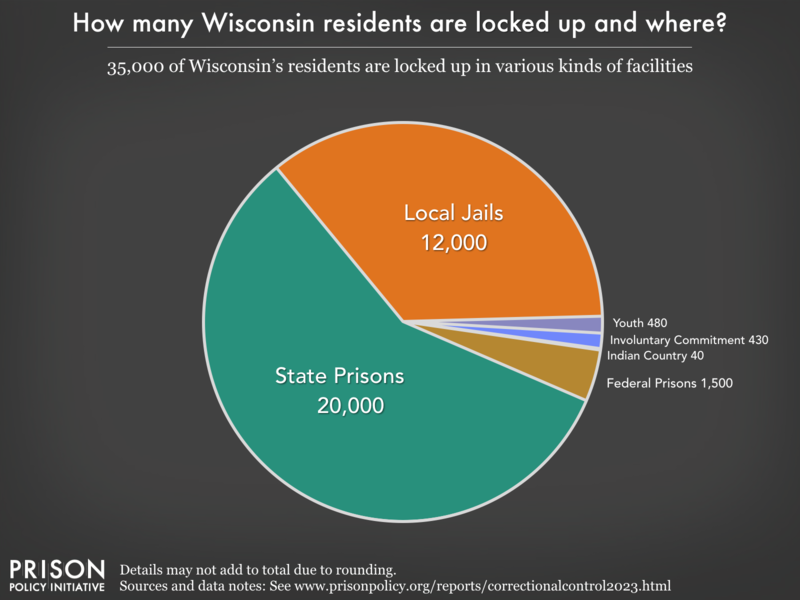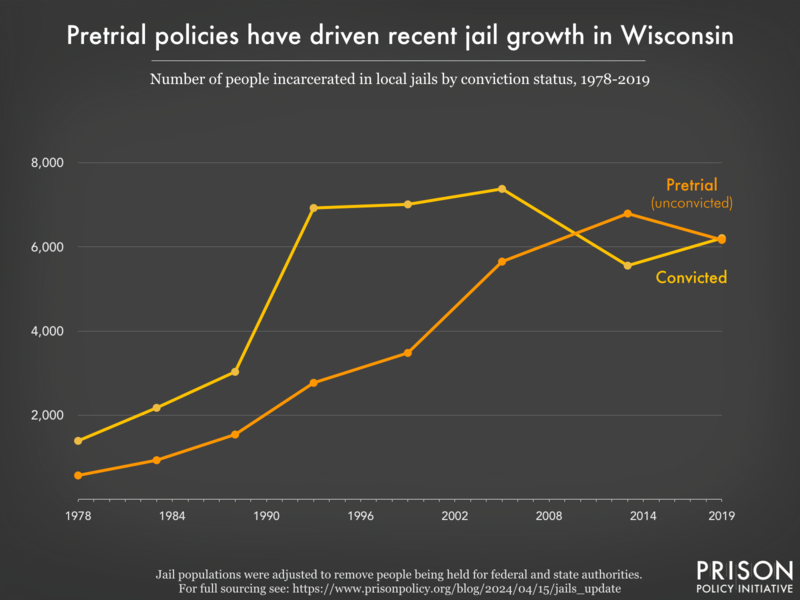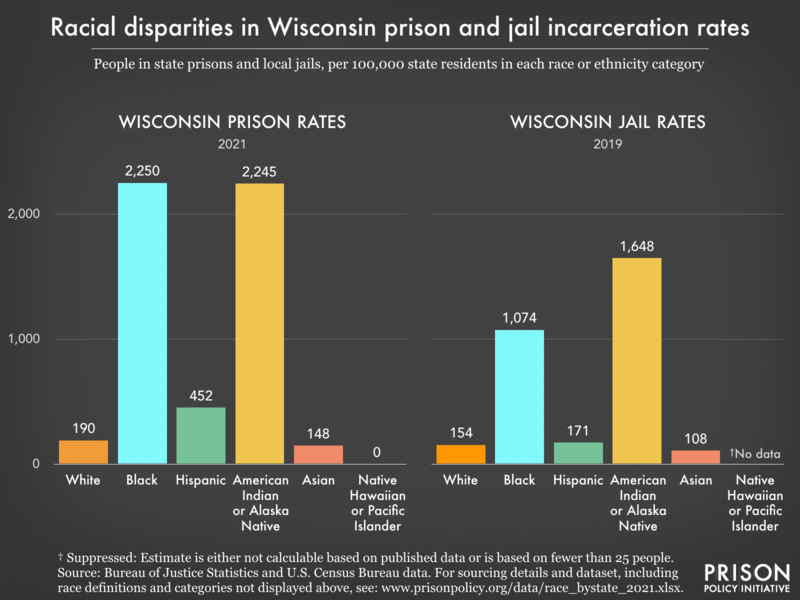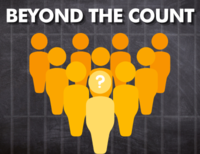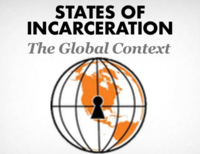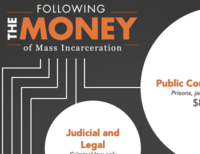Thank you,
—Peter Wagner, Executive Director
Donate
Wisconsin profile
Wisconsin has an incarceration rate of 615 per 100,000 people (including prisons, jails, immigration detention, and juvenile justice facilities), meaning that it locks up a higher percentage of its people than almost any democratic country on earth. Read on to learn more about who is incarcerated in Wisconsin and why.
35,000 people from Wisconsin are behind bars
Additionally, the number of people impacted by county and city jails in Wisconsin is much larger than the graph above would suggest, because people cycle through local jails relatively quickly. Each year, at least 129,000 different people are booked into local jails in Wisconsin.
Rates of imprisonment have grown dramatically in the last 40 years
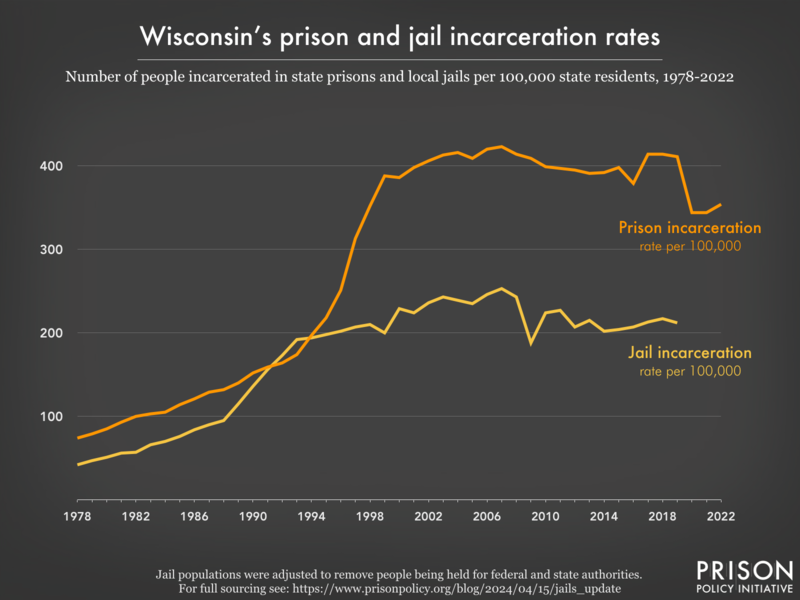
- total numbers rather than rates.
- Women’s prisons: Incarceration Rates | Total Population
- Men’s prisons: Incarceration Rates | Total Population
Today, Wisconsin’s incarceration rates stand out internationally

People of color are overrepresented in prisons and jails
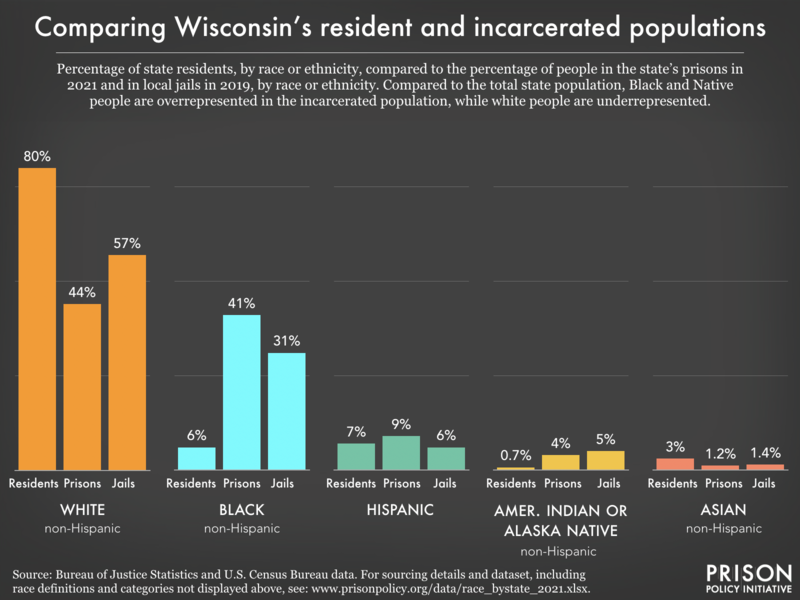
Wisconsin's criminal justice system is more than just its prisons and jails
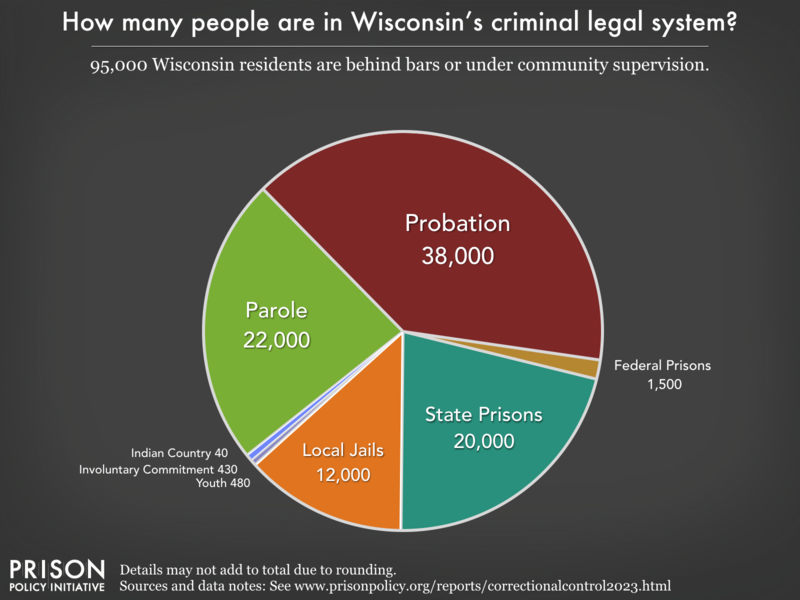
Reports and briefings about Wisconsin's criminal legal system:
Filter to show
- People on probation in Wisconsin are saddled with onerous rules and conditions they must follow every day or risk incarceration.
- Prisons in Wisconsin have tablets, but they may be being used to restrict incarcerated people’s access to books and sap them of the little money they have.
- With an incarceration rate of 615 per 100,000 residents, Wisconsin locks up a higher percentage of its people than almost any democratic country on earth.
- Prisons in Wisconsin force incarcerated people and their families — some of the most vulnerable members of society — to subsidize mass incarceration.
- 50% of people in Wisconsin jails have not been convicted of a crime, meaning they're legally innocent. There are simple steps the state can take to reduce this number. Why isn't it?
- Wisconsin releases roughly 168,553 men and 45,132 women from its prisons and jails each year. What is it doing to support them upon reentry?
- Wisconsin is one of a handful of states reviving harsh drug laws straight out of the '90s
- Wisconsin has a rare, mid-decade chance to end prison gerrymandering.
- Black people in Wisconsin are incarcerated at a rate 11.8 times higher than white people.
- Wisconsin's choice to criminalize "failure to appear" may be hurting public safety
- The cost of incarcerating older people is incredibly high, and their risk of reincarceration is incredibly low, yet 13% of people in Wisconsin prisons are over the age of 55. Why is the state keeping so many older people locked up?
- Wisconsin makes it difficult or even risky for incarcerated journalists to tell their stories.
- Wisconsin is one of 20 states that locks up some people convicted of sex offenses in shadowy "civil commitment" facilities, long after their sentences are over — and often indefinitely.
- In Wisconsin, 35,000 people are incarcerated and another 60,000 are on probation or parole.
- Wisconsin charges up to 10¢ for an e-message to or from prison.
- Jails in Wisconsin charge up to $3.15 for a 15-minute phone call, reaping profits for companies, while prisons charge 90¢ for a 15-minute call.
- Wisconsin prisons are replacing incarcerated people's personal mail with scans, stifling family contact
- Wisconsin suspended its $7.50 medical copays in prisons at the beginning of the pandemic for flu related medical visits — It should eliminate them entirely.
- Wisconsin prisons don’t have a clear indigence definition so it is unclear who has to pay for hygiene products and basics. Any money the DOC loans to someone for legal supplies must be paid back.
- Wisconsin prisons and Access Corrections don’t report data on fees to transfer money to an incarcerated loved one.
- One important action can help end local prison gerrymandering in Wisconsin
- We gave Wisconsin a failing grade in September 2021 for its response to the coronavirus in prisons.
- Wisconsin hinders jury diversity by excluding people with felony records until they complete probation and parole sentences
- How many COVID-19 cases in Wisconsin communities can be linked to outbreaks in correctional facilities? (data from our report Mass Incarceration, COVID-19, and Community Spread)
- We graded the parole release systems of all 50 states - Wisconsin gets an F-
- Wisconsin incarcerates women at a rate of 115 per 100,000 residents — higher than almost any democratic country on earth.
- People in Wisconsin prisons earn as little as 9¢ an hour for their work.
- Debate from Wisconsin: Prison-based gerrymandering's striking resemblance to the infamous three-fifths compromise
- Wisconsin sees dramatic prison-based gerrymandering in new state, county, city districts
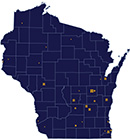 Importing Constituents: Prisoners and Political Clout in Wisconsin, by John Hejduk and Peter Wagner, March 2008
Importing Constituents: Prisoners and Political Clout in Wisconsin, by John Hejduk and Peter Wagner, March 2008
Other resources
- Research on Wisconsin in our Research Library
- Ending prison gerrymandering in Wisconsin campaign and resource page
